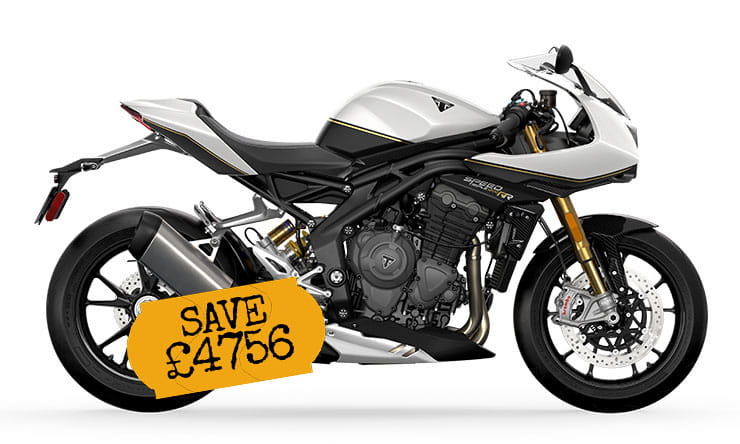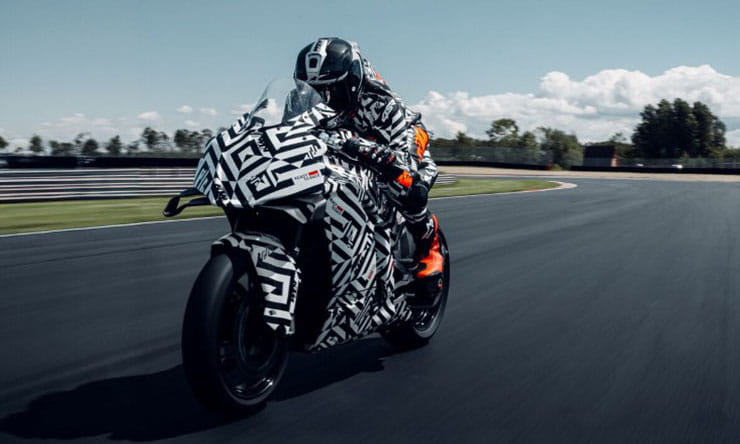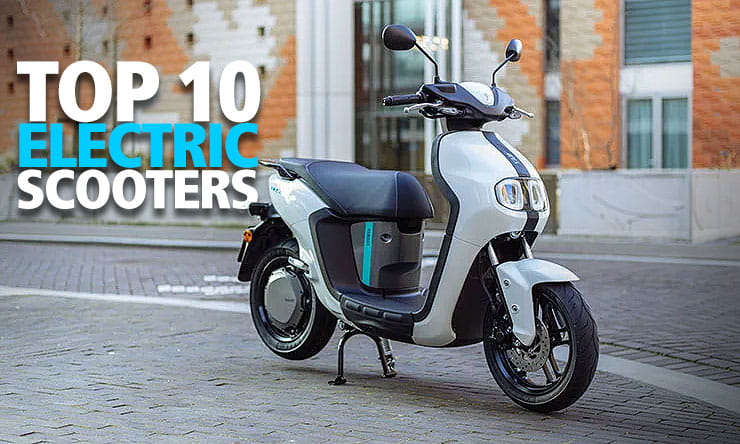
While electric motorcycles struggle to get out of the starting blocks, their scooter siblings are proving much more popular. In 2023 over 90% of newly registered battery-powered bikes made less than 15bhp, with most of the top sellers being step-thru scooters and mopeds.
It’s easy to see why. For the everyday urban commute an electric powertrain offers a number of advantages. There’s instant torque to get away from the lights, with no lag or power being sapped from a CVT transmission. There’s no fuel wasted while idling, and no engine or exhaust trying to toast your buns come the middle of summer. The usual electric downsides don’t matter as much either. An enormous range isn’t so essential – not when the whole of central London is just 15 miles across – so batteries can be smaller, lighter, cheaper and easier to package. The lack of clutch and gears doesn’t feel so alien if you’re already used to a twist-and-go petrol scooter. And providing you can charge at home, the “fuel” cost of a leccy scoot is a fraction of even the most frugal four-stroke.
Electric can dovetail neatly with the daily routine too: charge overnight, wake up to a full tank every morning, ride to work and back, then plug in once home and repeat tomorrow. No time lost visiting petrol stations and no need to faff with public chargers. Don’t have a power socket where you park? Removable batteries let you leave the rest of the bike outside and just bring the bit that needs charging indoors.
The government will even help you buy one. Provided it costs less than £10,000 (as almost all electric scooters do) the Plug-In Motorcycle Grant pays up to £500, or £150 for electric mopeds. (FYI, all prices on this page are quoted with the PiMG grant already taken off.) With offerings from both brand-new electric upstarts as well as long-established motorcycle firms, plus a range of models designed to fit every licence, experience and budget, it can be hard to know where to start. So, here’s our shortlist featuring 10 of the very best battery-powered scooters, commuters and mopeds you can buy in 2024.
1. Super Soco CPx – £3299
2. Yadea G5S – £2980
3. Horwin EK3 – £3399
4. Niu MQi GT Evo – £3999
5. Silence S01 – £4995
6. Segway E300SE – £3999
7. Honda EM1 e: – £4999
8. Yamaha NEO’s – £2950
9. Piaggio 1 – £2700
10. BMW CE 04 11kW – £12,850
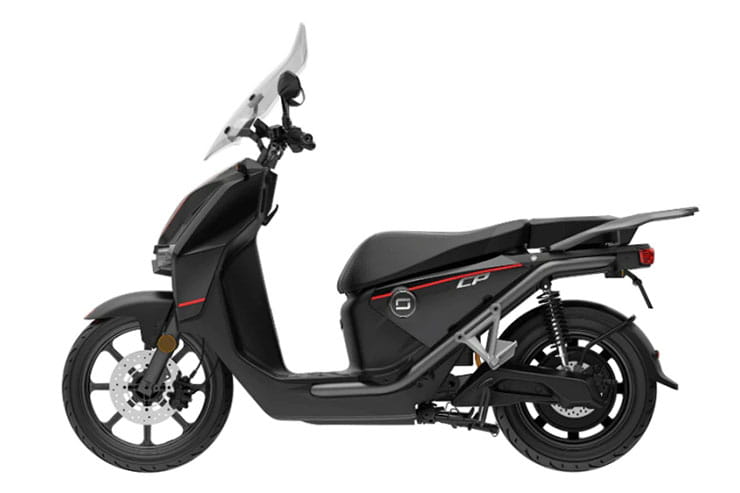
Meet the best-selling electric scooter in the UK. Super Soco’s CPx was launched in late 2020 to a nation of nervous commuters, torn between being encouraged to return to the office but desperate to avoid public transport. In its first full year on sale, the CPx sold in such astonishing volumes it became one of the top 10 biggest-selling motorcycles of 2021.
The CPx recipe is pretty straightforward. A 6bhp motor sits inside the rear wheel, a huge weather-beating windscreen lives up front, and your choice of one or two 2.7kWh removable batteries sit under the seat (which, awkwardly, absorb any storage space). Stay under 30mph and it can last up to 80 miles with two batteries, or around half as far if you spend all your time at its 56mph top speed.
A single-battery CPx usually costs £3299, with the dual-battery version £3799. However, at time of writing (March 2024) Super Soco have dropped the dual-battery version to just £3199. Read our review of the Super Soco CPx here.
- Power: 6bhp (maximum) / 5bhp (continuous)
- Top speed: 56mph (claimed)
- Weight: 125kg (single battery) / 143kg (dual battery)
- Battery: 2.7kWh (single battery) / 5.4kWh (dual battery)
- Licence: A1
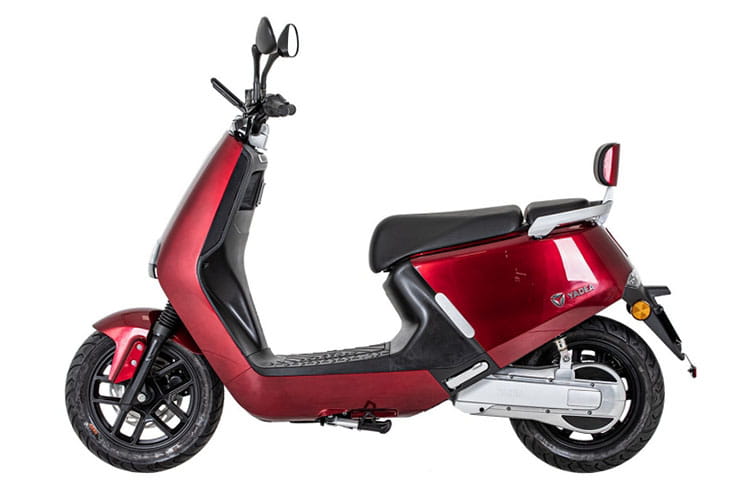
Not heard of Yadea? In 2022 their annual sales topped 14 million bikes, making them the planet’s biggest electric two-wheeler brand. For a bit of context, that year Honda sold 17 million bikes – so, yes, they’re a serious player. The G5S is their biggest-selling model in the UK, and it’s easy to see why when it’s priced at less than £3000. It uses a 5bhp mid-mounted motor with a belt final drive, claims a 50mph top speed, and packs a pair of removable batteries holding nearly 3kWh between them. Yadea UK claim that’s enough for a range of 72 miles – though without having tested it, our chins feel rather itchy. We’d budget on more like 40-50 miles of commuting. Yadea also claim a featherweight 81kg, which we’ll presume is without the batteries fitted. Otherwise it features a steel tube frame, 7-inch LCD dash, simple suspension and linked disc brakes. Yadea have more than 30 dealers up and down the UK, with distribution via Exeter-based importers Lexmoto.
- Power: 5bhp (maximum) / 4bhp (continuous)
- Top speed: 50mph (claimed)
- Weight: 81kg (claimed, without batteries)
- Battery: 2.88kWh
- Licence: A1
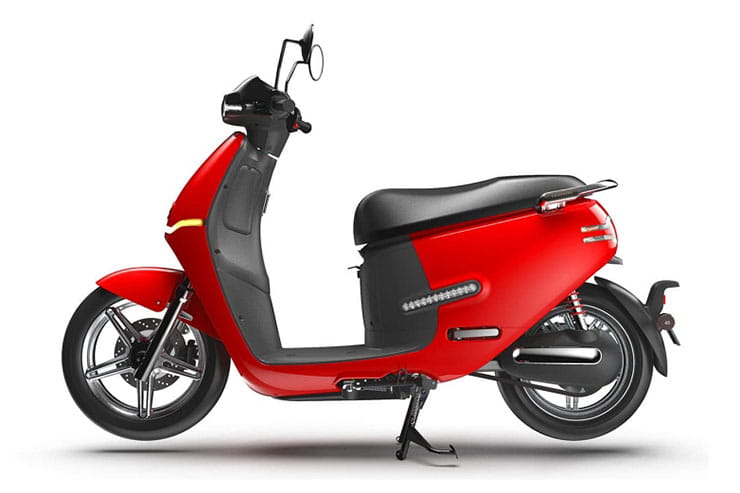
The Horwin EK3’s soft, curvy, slightly retro styling disguises some modern touches, including LED lights, keyless ignition, an LCD dash, cruise control, plus a USB charging port by your right knee. Its air-cooled motor is mid-mounted, driving the rear wheel via a chain. It can put out up to 8bhp, enough to silently sneak up to nearly 60mph. There’s a removable battery under the seat (though quite a big one, weighing around 17kg), holding enough energy to last 40 to 50 miles of steady urban trundling (or 20-25 miles of top-speed riding). When it’s flat, you’ll need around four hours to fully refill the battery using an offboard charger plugged into a standard household socket. Or, if you want, you can specify a twin-battery version of the EK3, doubling range, for an additional £1000. Right now (March 2024) importers Artisan Scooters are sweetening the deal with a free leg cover worth £129.
- Power: 8bhp (maximum) / 5bhp (continuous)
- Top speed: 59mph (claimed)
- Weight: 109kg (single battery) / 126kg (dual battery)
- Battery: 2.6kWh (single battery) / 5.2kWh (dual battery)
- Licence: A1
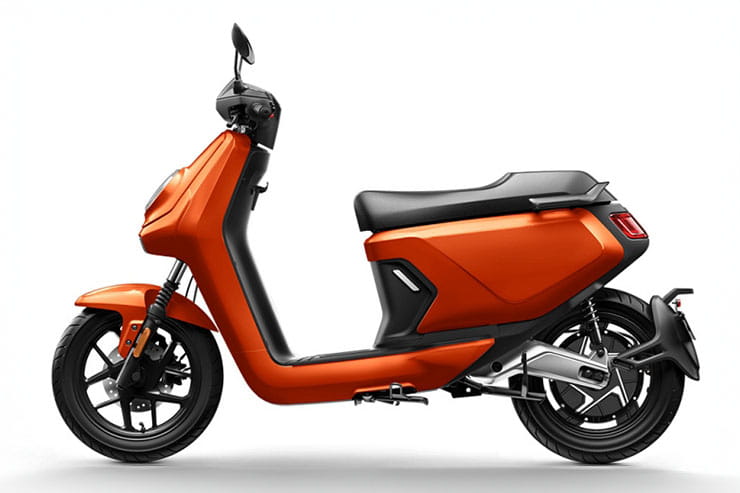
The fastest model in the range of Chinese firm Niu (as in “New”) is this spilled tin of alphabet spaghetti: the MQi GT Evo. The 9bhp motor mounted in its rear wheel is quick enough to thrust the scoot on to 60mph (and perhaps even a bit beyond). Energy is stored in a pair of removable 1.87kWh batteries – smaller than many rivals, but also considerably lighter at just 11kg each. That’s worth bearing in mind if you plan on regularly removing the batteries to charge them indoors. A full recharge takes around 5 hours, and with both packs brimmed Niu claim a range of between 46 and 70 miles. The MQi GT Evo is normally priced at £3999, but right now (March 2024) Niu have dropped it to just £2999. Read our review of the Niu MQi GT Evo here.
- Power: 9bhp (maximum) / 7bhp (continuous)
- Top speed: 60mph (claimed)
- Weight: 128kg
- Battery: 3.7kWh
- Licence: A1
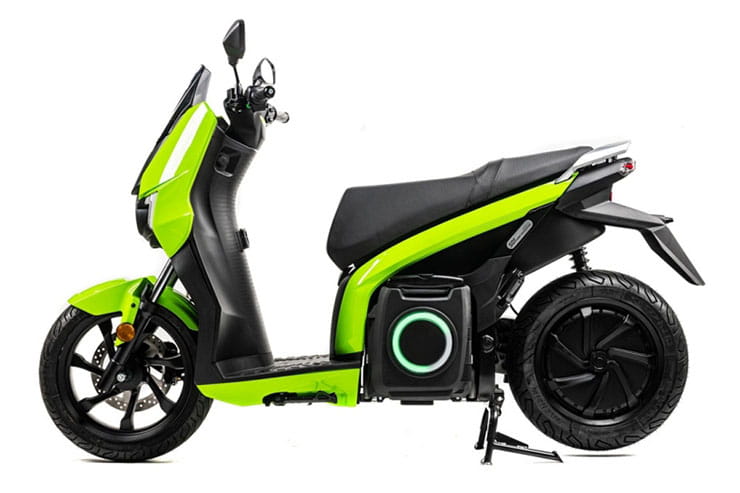
The most expensive scooter on our list so far, and (not coincidentally) the first that isn’t built in China. Instead the S01 is made near Barcelona in Spain, where Silence have been steadily growing their electric scooter business since 2012. Its party piece is a trolley-style removable battery, which slides out sideways while sprouting a pair of wheels and a telescopic handle. This means you can wheel it round like a suitcase, rather than having to lift it out and lug it indoors. Good thing, given it weighs over 40kg. In fairness the battery does store an impressive 5.6kWh, enough to last 70-ish miles of commuting, or around 35 miles of faster riding. The unit also contains the charger, though its modest power means a full recharge takes 8 hours. The S01 is one of the faster A1 electric scooters thanks to a 12bhp hub-mounted motor, which drives with impressive force from a standing start and goes on to a claimed 62mph top speed. Silence also offer an S01+ model with a shade more performance and a higher chassis spec, though it’s £6195.
- Power: 12bhp (maximum) / 9bhp (continuous)
- Top speed: 62mph (claimed)
- Weight: 150kg (est)
- Battery: 5.6kWh
- Licence: A1
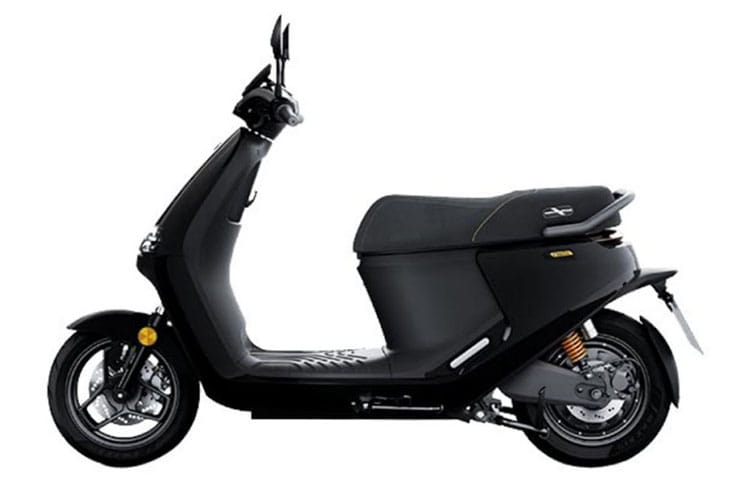
Yes, the same Segway you’re thinking of – but no, this isn’t some daft self-balancing skateboard thing bought by Silicon Valley tech hippies. The E300SE might look fairly anonymous on the outside, but on specification and features this is one of the most complete offerings the electric scooter class has seen. For starters its 13bhp hub motor is remarkably potent, acceleration is startling, and that 65mph top speed claim is entirely accurate. The E300SE comes with safety aids lacking from most other A1-class electric scooters, including both ABS and traction control. Its pair of 2kWh removable batteries live beneath your feet, freeing up space under the seat for 34 litres of storage. WMTC-tested range is 53 miles, increasing to 60-70 if you stick to slow speeds in Eco mode, or falling to 30-40 miles if you ride faster. A full charge of both batteries takes around five hours. The Segway name might raise a chuckle, but given its performance, practicality and price their E300SE deserves to be taken very seriously.
- Power: 13bhp (maximum) / 10bhp (continuous)
- Top speed: 65mph (claimed)
- Weight: 127kg (claimed)
- Battery: 4.0.kWh
- Licence: A1
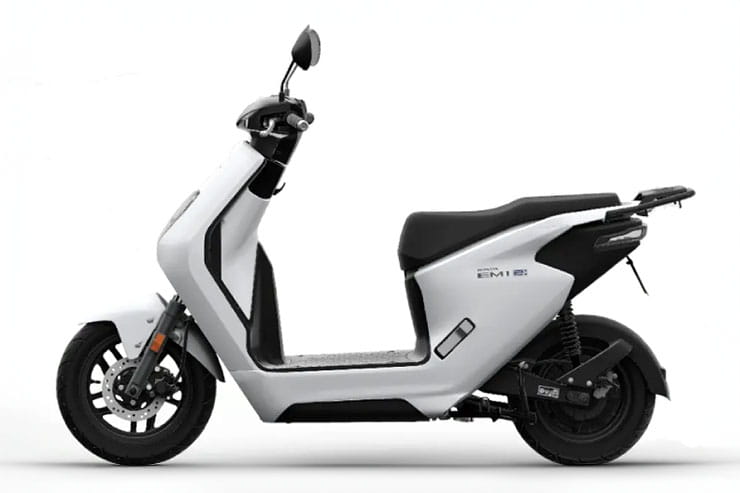
The first electric two-wheeler from Honda to go on sale in Europe, the EM1 e: was launched last year as a battery-powered moped (50cc rather than 125cc) equivalent. That means a top speed of just 45kph (28mph), and a maximum power output from its hub-mounted motor of just 2bhp – yes, two. Fine if you’re 16 years old, or have a strictly inner-city commute, but not a lot to be getting on with beyond that. The upside is that because the motor can’t draw much power from the battery, the EM1 e: covers a claimed 25 miles from a fairly tiny 1.5kWh battery pack. So if energy efficiency and rock-bottom fuel costs are your thing, step this way. The downsides are that there’s no ABS, a full recharge takes six hours, and Honda are asking a frankly startling £4999. Ooof.
- Power: 2.3bhp (maximum) / 0.8bhp (continuous)
- Top speed: 28mph (claimed)
- Weight: 95kg
- Battery: 1.5kWh
- Licence: AM
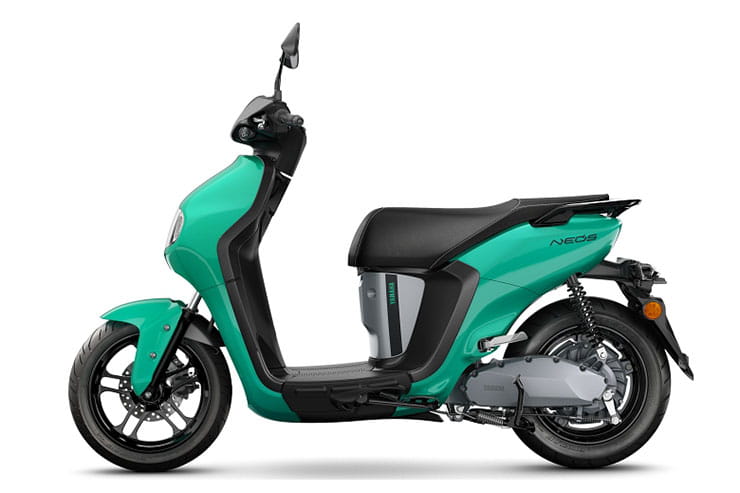
Launched in 2022, the NEO’s (don’t blame us for the greengrocer’s apostrophe – that’s how Yamaha spell it) is a moped-equivalent electric scooter. It comes with a single 1kWh battery claimed to be good for 23 miles. If you want to go further afield, you can add a second 8kg battery pack (an extra £1143), which extends range to 42 miles. The hub-mounted motor puts out 3bhp and, being an AM-licence machine, top speed is 27mph. If that sounds a bit heady there’s an ‘Eco’ riding mode which cuts top speed to 22mph and reduces power to 2bhp in a bid to maximise range. With one battery fitted there’s also 27 litres of underseat storage, which might be just enough to stash an open-face lid. Prices start at under £3000, considerably undercutting Honda’s EM1 e: Read our review of the Yamaha NEO’s here.
- Power: 3.4bhp (maximum) / 3.1bhp (continuous)
- Top speed: 27mph (claimed)
- Weight: 98kg (single battery) / 106kg (dual battery)
- Battery: 1kWh (single battery) / 2kWh (dual battery)
- Licence: AM
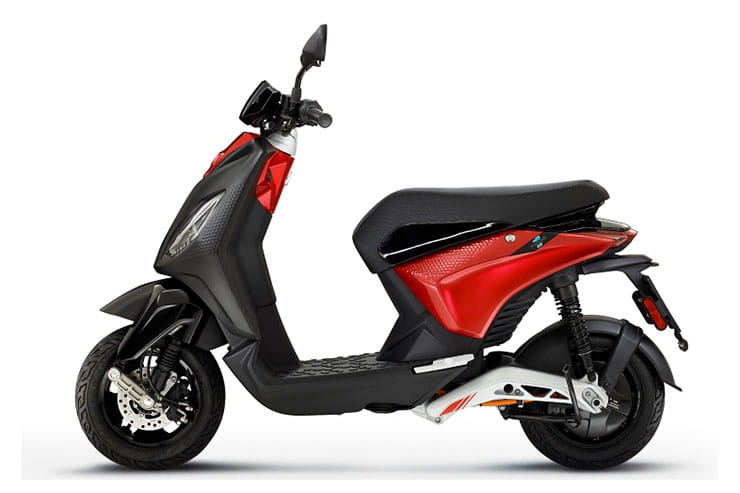
Ironically, for a bike named simply “1”, Piaggio’s electric scooter comes in two versions. First there’s the standard moped-equivalent Piaggio 1, which has a 2bhp motor, a 1.4kWh battery and an AM-friendly 28mph top speed. There’s also the faster Piaggio 1 Active, which doubles power to 4bhp, ups battery capacity to 2kWh and raises top speed to 37mph. That puts the Active in a peculiar place: too fast to be legally classified as a moped; not really fast enough to keep up with other A1 scoots. With that in mind the regular “1” seems to make more sense to us, especially given its £2700 official price tag is currently cut to just £2250, or half the cost of its Honda rival. For that you get a claimed range of 27 miles, sporty styling, keyless ignition, colour LCD display and a fab-looking single-sided front end. Read our review of the Piaggio 1 Active here.
- Power: 1.8bhp (maximum) / 1.6bhp (continuous)
- Top speed: 28mph (claimed)
- Weight: 85kg
- Battery: 1.4kWh
- Licence: AM
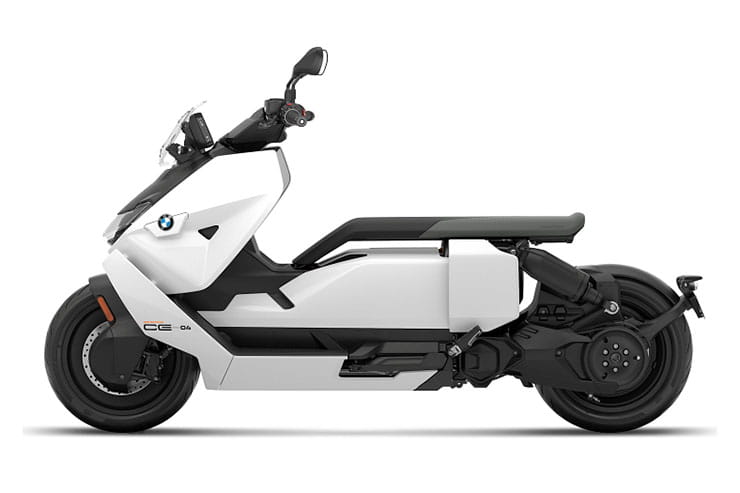
Clearly an outlier given the rest of the electric commuter options, but worth including on this list to highlight the variety out there. As standard BMW’s CE 04 leccy maxi-scoot is an A2-class machine, making 42bhp. But it’s also available in a restricted version for A1 licences, with its peak power reduced to 31bhp and range reduced to a claimed 62 miles. Top speed remains 75mph, it just gets there a bit slower than the full-power version. Compared to other A1 electric scoots it’s in a completely different universe when it comes to weight, price and performance. But, hey, if you can afford to splash the cash and want to ride the most powerful, longest-range and most luxurious offering in the A1 electric scooter class, then you’ll be wanting to head to a BMW dealership and asking for a test ride on one of these. Read our review of the BMW CE 04 here.
- Power: 31bhp (maximum) / 15bhp (continuous)
- Top speed: 75mph (claimed)
- Weight: 231kg
- Battery: 8.9kWh (maximum) / 8.5kWh (nominal)
- Licence: A1
If you’d like to chat about this article or anything else biking related, join us and thousands of other riders at the Bennetts BikeSocial Facebook page.















